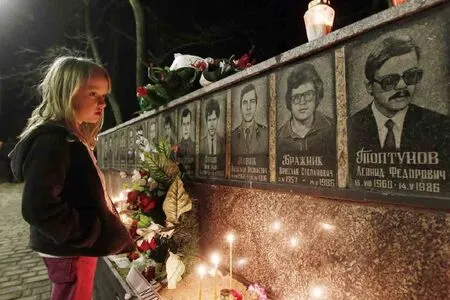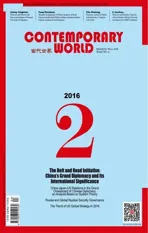Russia and Global Nuclear Security Governance
2016-11-23XInGGUAnGcHEnG
XInG GUAnGcHEnG
Director and Researcher, Institute of Chinese Borderland Studies,Chinese Academy of Social Sciences
Russia and Global Nuclear Security Governance
XInG GUAnGcHEnG
Director and Researcher, Institute of Chinese Borderland Studies,Chinese Academy of Social Sciences

On April 26,1986, the unit 4 reactor of Chernobyl Nuclear Power Plant located 130 kilometers north of Ukraine capital Kiev exploded,leaking a lot of radioactive matter. As much as 1,650 square meters of land is subjected to nuclear radiation, which is so far the worst nuclear leakage accident in the world. The picture shows on April 26, 2011, people burn candles to commemorate the victims of Chernobyl nuclear leakage accident.
As one of the world major nuclear powers, Russia shoulders an extremely important responsibility in the domain of nuclear security. According to Russia, the international community should continuously improve and perfect the mechanism of safeguarding the nuclear security. Although the disintegration of the Soviet Union brought about uncertainties to the management of nuclear weapons once owned by the former Soviet Union, Russia soon afterwards strengthened its control over the nuclear weapons. For example, the Russian Government issued the Principal Measures for Safeguarding Nuclear Weapons in as early as 1996, and set up a well-established national system for the management of nuclear weapons.
Russia has invested huge energy in all the four most important areas of current international cooperation for global nuclear security, namely global nuclear security governance, prevention of nuclear terrorism, enforcement of global nuclear material security and enforcement of global nuclear facilities security.
Russia has been actively participating in the global nuclear security governance. It has participated in the first and second Nuclear Security Summits and played a significant role. It signed an agreement with the US on “updating the commitment to dispose of weapon-grade plutonium” at the first Summit. Russia supports the IAEA to play a decisive role in enhancing the global nuclear security framework and a core role in coordinating the international cooperation on nuclear security. Russia also worked together with the US in launching a “global initiative to crack down nuclear terrorism” in 2006,which received responses from many countries.
Russia holds a positive stand on preventing nuclear terrorism and enhancing global nuclear material and facilities security as well. The international community concerns more about the non-proliferation issue in the global nuclear security governance in the 21st century. Since the international community is in general faced with the terrorist threat, Russia has adopteda series of effective measures in safeguarding the security of nuclear facilities and materials, and strengthened its capability against the possible terrorist attack on its nuclear facilities. Russia actively participates in the international cooperation for preventing the proliferation of nuclear weapons,strives for the peaceful solution of the Iran nuclear issue and advocates a non-nuclear Korea Peninsula.
Russia supports the multilateral cooperation on global nuclear security governance. On 21 May 2003, Russia officially signed with the US and European states the Multilateral Nuclear Environmental Programme in the Russian Federation to strengthen nuclear security cooperation by working together in ensuring the security in handling the radioactive wastes in northern Russia, the security of nuclear fuel and nuclear reactors. The European states also provide assistance to Russia in the form of international assistance funds. In 2004, Russia supported the UN adoption of Resolution 1540 aiming at eliminating the threat of possible involvement of state actors in mass destruction weapons,particularly nuclear weapons. In 2009,Russia supported the UN adoption of Resolution 1887 which showed severe concerns about the threat of nuclear terrorism and for the prevention of acquiring nuclear materials and technologies by terrorists. On 16 June 2015,Russia and Norway had a discussion on nuclear and radiation security, and signed an agreement for cooperating on early-stage alarming system for nuclear accident. The two countries also carried out cooperation in recovery of radioactive wastes.
Russia has always been proactive in peaceful use of nuclear energy. It has enthusiastically promoted its nuclear reactor technology in international nuclear energy market, and cooperated with a large number of countries in building nuclear power plants. Russia has shown a very prudent attitude toward the peaceful use of nuclear energy. Because of the extremely agonizing Chernobyl Accident, Russia has made very meticulous efforts in perfecting the mechanism for nuclear security management and safeguarding, especially in perfecting the infrastructure for handling the radioactive wastes in nuclear facilities. With the twists and turns in Russia-US relations, President Putin did not attend the third Nuclear Security Summit held in Hague in March 2014; neither did he sign on the agreement for safeguarding nuclear security. Nevertheless, Russia's position in global nuclear security governance has remained unchanged. At this Summit, Russian Foreign Minister Lavrov called for all countries, particularly those with huge nuclear material reserves, to jointly carry out international legal obligations in nuclear security area. He also proposed that the basic international legal documents in nuclear security area be endowed with universality so as to ensure that all states could join as soon as possible. In addition, Mr. Lavrov explicitly stressed that Russia attached particular importance to improving the security of nuclear materials as well as the information of relevant facilities. For that reason, it's necessary to strengthen the security of the automatic control system influential to the security of using nuclear energy facilities. Russia also showed concerns about the accumulation of weapon-grade fission materials by a number of non-nuclear states.
All signs show that today's global nuclear security governance is turning from close cooperation among major powers against nuclear terrorism and proliferation to fierce gaming among major powers. Russia's concept on nuclear security is directly relevant to its recognition of the military danger and threat it faced with. In its new edition of military theory approved in December 2014, Russia explicitly expressed that although with decreasing possibility of the outbreak of massive wars against Russia, the military danger faced by Russia is instead increasing in some aspects. As one of the world biggest nuclear powers, Russia has formulated a whole set of principles, policies and ideas about nuclear security, and nuclear deterrent is one of the most significant cards to play in solving its strategic military problems. Russia has made clear the precondition and prerequisite for using nuclear weapons,i.e. Russia maintains its right to fight back with nuclear weapons when itself or its allies are attacked by nuclear weapons or other weaponsof mass destruction, or when they are attacked by conventional weapons which may cause the destruction of the state. It demonstrates that Russia regards the use of nuclear weapons as the most important means to safeguard its own interests as well as the interests of its allies. Russia takes strategic containment as one of the major tasks of its armed forces in peace time, which includes nuclear containment and nonnuclear containment. Russia maintains its potential for nuclear containment according to specified level of combat readiness.
As one of the most capable states in nuclear strike, Russia is clearly aware of its strategic opponent being the US. The Soviet Union and the US both sought for a balance of nuclear terror during the Cold War. With the end of the Cold War, Russia still sought for a balance of nuclear capacity with the US with the prerequisite of nuclear weapon cutting. Faced with a situation of descending comprehensive national strength, Russia attaches more importance to nuclear military capacity as an important means for safeguarding its own strategic interests. The relations between Russia and western countries have been in continuous tension due to the Ukraine issue and the Syria issue, which brought about some major backdrops in the nuclear security cooperation between Russia and the US. As a result, Russia no longer wants to have close cooperation with the western countries on nuclear security.
All the same, faced with more and more serious danger of terrorist threat in today's world, Russia will neither stop nor change the process of the international cooperation on global nuclear security governance, though it may make some changes or readjustments on measures, forms and focuses.
